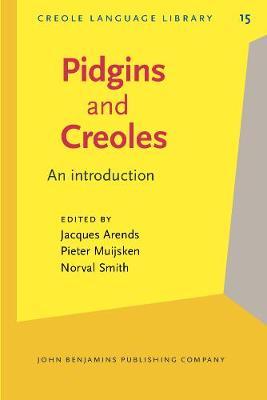Overview
This introduction to the linguistic study of pidgin and creole languages is clearly designed as an introductory course book. It does not demand a high level of previous linguistic knowledge. Part I: General Aspects and Part II: Theories of Genesis constitute the core for presentation and discussion in the classroom, while Part III: Sketches of Individual Languages (such as Eskimo Pidgin, Haitian, Saramaccan, Shaba Swahili, Fa d'Ambu, Papiamentu, Sranan, Berbice Dutch) and Part IV: Grammatical Features (such as TMA particles and auxiliaries, noun phrases, reflexives, serial verbs, fronting) can form the basis for further exploration. A concluding chapter draws together the different strands of argumentation, and the annotated list provides the background information on several hundred pidgins, creoles and mixed languages. Diversity rather than unity is taken to be the central theme, and for the first time in an introduction to pidgins and creoles, the Atlantic creoles receive the attention they deserve. Pidgins are not treated as necessarily an intermediate step on the way to creoles, but as linguistic entities in their own right with their own characteristics. In addition to pidgins, mixed languages are treated in a separate chapter. Research on pidgin and creole languages during the past decade has yielded an abundance of uncovered material and new insights. This introduction, written jointly by the creolists of the University of Amsterdam, could not have been written without recourse to this new material.
Full Product Details
Author: Jacques Arends (University of Amsterdam) , Pieter Muysken (University of Amsterdam) , Norval Smith (University of Amsterdam)
Publisher: John Benjamins Publishing Co
Imprint: John Benjamins Publishing Co
Edition: annotated edition
Volume: 15
Weight: 0.750kg
ISBN: 9789027252371
ISBN 10: 9027252378
Pages: 412
Publication Date: 20 December 1994
Audience:
College/higher education
,
Professional and scholarly
,
Tertiary & Higher Education
,
Professional & Vocational
Format: Paperback
Publisher's Status: Active
Availability: Awaiting stock 
The supplier is currently out of stock of this item. It will be ordered for you and placed on backorder. Once it does come back in stock, we will ship it out for you.
Table of Contents
1. Preface; 2. List of abbreviations used; 3. Maps; 4. I. General aspects; 5. 1. The study of pidgin and creole languages (by Muysken, Pieter); 6. 2. The socio-historical background of creoles (by Arends, Jacques); 7. 3. Pidgins (by Bakker, Peter); 8. 4. Mixed languages and language intertwining (by Bakker, Peter); 9. 5. Variation (by Rooij, Vincent de); 10. 6. Decolonization, language planning and education (by Appel, Rene); 11. 7. Creole literature (by Adamson, Lilian); 12. II. Theories of genesis; 13. 8. Theories focusing on the European input (by Besten, Hans den); 14. 9. Theories focusing on the non-European input (by Arends, Jacques); 15. 10.Gradualist and developmental hypotheses (by Arends, Jacques); 16. 11. Universalist approaches (by Muysken, Pieter); 17. III. Sketches of individual languages; 18. 12. Eskimo pidgin (by Voort, Hein van der); 19. 13. Haitian (by Muysken, Pieter); 20. 14. Saramaccan (by Bakker, Peter); 21. 15. Shaba Swahili (by Rooij, Vincent de); 22. 16. Fa d'Ambu (by Post, Marike); 23. 17. Papiamento (by Kouwenberg, Silvia); 24. 18. Sranan (by Adamson, Lilian); 25. 19. Berbice Dutch (by Kouwenberg, Silvia); 26. IV. Grammatical features; 27. 20. TMA particules and auxiliaries (by Bakker, Peter); 28. 21. Noun phrases (by Bruyn, Adrienne); 29. 22. Reflexives (by Muysken, Pieter); 30. 23. Serial verbs (by Muysken, Pieter); 31. 24. Fronting (by Veenstra, Tonjes); 32. V. Conclusions and annotated language list; 33. 25. Conclusions (by Arends, Jacques); 34. 26. An annotated list of creoles, pidgins, and mixed languages (by Smith, Norval); 35. Bibliography; 36. Subject index; 37. Index of languages; 38. Index of place names; 39. Author Index
Reviews
... this is undoubtedly the best book for use as a part of a university course on pidgin and creole languages that has yet appeared. Philip Baker, Bulletin of the School of Oriental and African Studies, 59:2 (1996). The work is, without doubt, the definitive intoduction to pidgin and creole languages and linguistics. As a textbook, it would be ideal for an introductory or advanced undergraduate course in pidgin and creole languages. -- Dudley K. Nylander, Studies in Language 23.1
Author Information
Tab Content 6
Author Website:
Customer Reviews
Recent Reviews
No review item found!
Add your own review!
Countries Available
All regions
|




